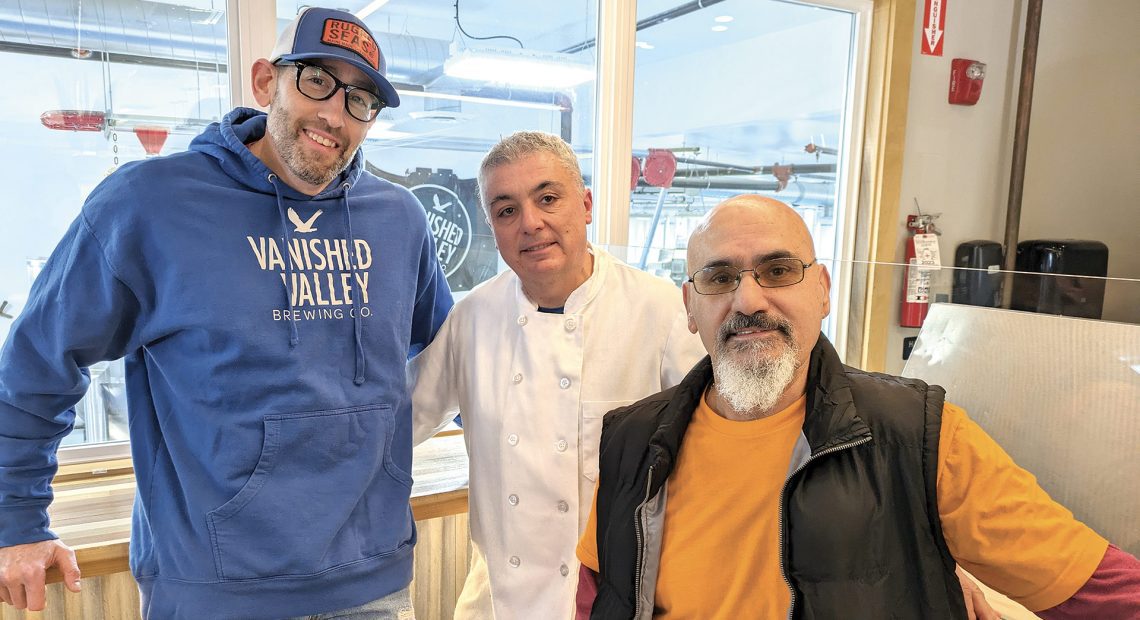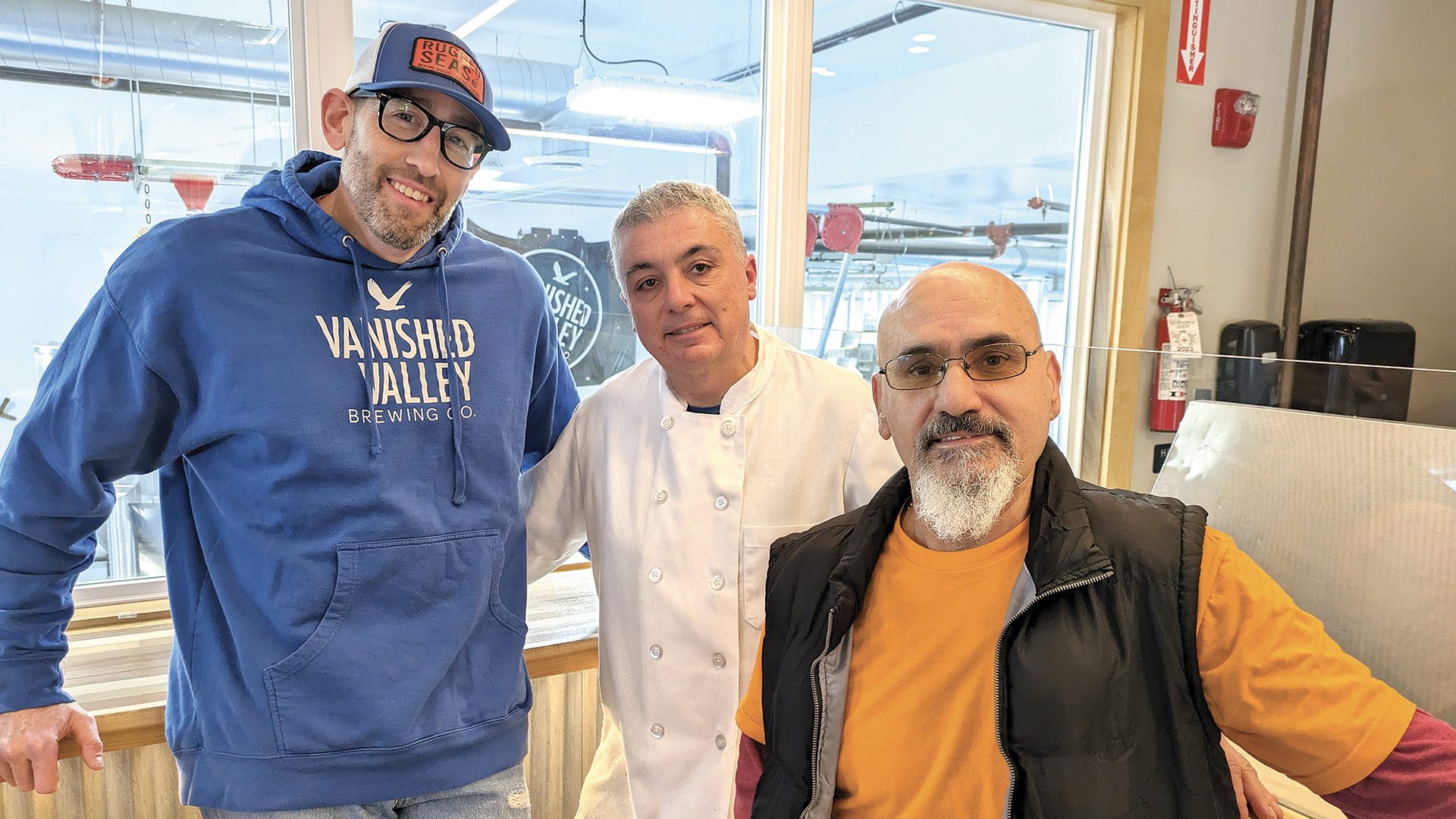
Vanished Valley Brewing Rolls with the Punches
Yes They Can

From left, Vanished Valley principals Joshua Britton, Michael Rodrigues, and Manny Vital.
Josh Britton remembers the early, heady days of Vanished Valley Brewing Co. — and the challenging ones that followed.
He had started brewing beer in his garage around 2015 when he met Michael Rodrigues, owner of Europa Black Rock Bar & Grille in Ludlow, and Manny Vital, who owned Europa’s building on Route 21. Vital retrofitted a building out back that became the first Vanished Valley brewery; the name was chosen to honor the drowned Quabbin Reservoir towns of Dana, Enfield, Greenwich, and Prescott.
“We started that process in 2016, but the licensure took nine months for approvals at the state level. Then we started hammering it out in 2017,” Britton said. Within a year or two, the brewery was rated third-best in Massachusetts by BeerAdvocate.
“We had lines out the door,” he added. “We were only producing like 10 barrels at a time, which for that space is a lot of barrelage; it’s pretty tight in there. We were selling cans in a tent next to the building and doing well. And we were fueling Europa with our kegs. We had people show up and ask, ‘oh, where’s your taproom?’ And they found out it was just a small, 20-by-20 space.”
Rodrigues decided to retire the Europa brand early in 2019 when he saw an opportunity to expand Vanished Valley with expanded production space and a food operation, and the three principals started gutting and updating the building, and also putting up an addition.
“Mike stayed up nights smoking meat — night after night after night, just to meet demand. So we were delivering barbecue and beer to door to door, and it stuck.”
“We wanted to add the food element in a bigger retail space, so it made sense, obviously, to do it right there,” Britton said. “We worked on it all throughout 2019 while still producing beer, and then we were ready to go in January 2020.”
Everyone knows what happened next.
“We had just opened our doors, and then a couple months later, it came to a halt because of COVID,” he said. “It was an interesting time. It forced us to kind of relook at the brand and pivot and decide what fell within the guidelines of what we could and couldn’t do.”
The pivots they came up with not only kept the business afloat during the pandemic, they may have actually raised its profile.
“No place could open and serve food, but we were allowed to deliver food — and beer, for the first time in Massachusets. So we started doing takeout. We didn’t have barbecue as a food option at the time, and Mike came up with the great idea to say, ‘hey, how cool would it be to have fresh barbecue and beer delivered to your door?’
“So we added that as a takeout option, and it was the most popular one we had,” Britton continued. “Mike stayed up nights smoking meat — night after night after night, just to meet demand. So we were delivering barbecue and beer to door to door, and it stuck. We still have great barbecue today; we kept it on the menu.”

Murals in Vanished Valley’s lower level reflect the theme of the drowned Quabbin towns.
Between the successful delivery operation, as well as two Paycheck Protection Program loans and an Economic Injury Disaster Loan, the team was able to keep the operation running. “It was a stressful year, but we made it. Once we were allowed to open the doors, we took all the necessary precautions with social distancing and things like that. It kept the lights on, and it kept the brand alive.”
Beneath the Surface
Some of the brewery’s beer selections — 1939 Amber Ale, Cellar Hole Series, Lost Town Stout, etc. — pay homage to the history of the Quabbin.
“The name itself, Vanished Valley, is the tip of the cap to the Quabbin Reservoir and the people that sacrificed for the benefit of others,” Britton said. “We try to keep the names of the beers as Quabbin-esque as possible. Sometimes it’s hard to do, and we just come up with other ideas. But the brand itself commemorates the Quabbin area.”
At any given time, Vanished Valley makes, pours, and distributes — to liquor stores and other restaurants across Massachusetts, from New York to Cape Cod — an array of IPAs, ales, stouts, and more, he added.
“We are very IPA-heavy, but that’s not to say that we don’t appreciate and still produce the classic brands, like a good lager or a pilsner. Some of our bestsellers in-house are actually our light beers. But when we distribute, the more popular ones are the IPAs.”
Britton explained that Vanished Valley straddles two different models.
“When you’re thinking about a brewery, you can be one of three different types of breweries. You can be a contract brewer, where you hire someone to brew your beer for you, and they send it out, and that’s it. Look at Jim Koch’s story with Sam Adams; that’s how he started. Then there’s a straight manufacturing-like brewery, where all you’re doing is pumping liquid out the back door and putting it on the shelf in the store.
“Then there’s us. We’re a brewpub,” he went on. “We wanted to have the food element, but we didn’t want to give up on the opportunity for mass distribution. So we built the brewery to be a distribution model, but the retail side of the house is a straight brewpub. So I don’t need to produce a ton of beer for here, but I need to produce a ton of beer for the market. We wanted to go at it from both angles.”
As for the food element, Vanished Valley serves a broad menu of appetizers, soups and salads, wood-fired pizza, burgers and other handhelds, and, of course, barbecue platters featuring pulled pork, brisket, chicken, and St. Louis-style ribs. Dinner hours are more crowded than lunch, and Thursday through Sunday draw the biggest crowds.
“We have a beer garden out there in the warmer weather, with a massive tent,” Britton said, adding that Vanished Valley now allows groups to rent the space for weddings and large parties. “We have music out there; Manny built an amazing stage for our bands. We have a firepit … all the stuff that makes for a better environment.”
Inside, the brewery has also hosted events from a murder mystery dinner to a bonsai tree event to charcuterie board design, as well as events featuring outside vendors, like a chili cookoff.
“We wanted to have the food element, but we didn’t want to give up on the opportunity for mass distribution. So we built the brewery to be a distribution model, but the retail side of the house is a straight brewpub.”
“We rent this for smaller parties, too: birthday parties, anniversaries, retirement parties, stuff like that. We try to be a one-stop shop for as much as possible,” Britton said. “It’s hard to do sometimes, but compared to other brewpubs and breweries in the region, we are very, very diverse.
“I think we’re doing really well compared to a lot of other breweries in the industry,” he went on. “There have been some closures in the state, and we’re not going to be one of them. But you constantly have to tailor things to the customer, and that’s a constantly moving target. So one of the bigger challenges is staying fresh.”
Lager Than Life
Despite some shifts in the market, Britton said, Vanished Valley is doing well on both the brewpub and distribution sides.
“Our first struggle was dealing with the holy-grail beers — you know, what’s the next best thing? That’s what the craft-beer fanatics want — the search for the white whale, or whatever they want to call it. We were one of those whales initially, and we gained a lot of loyal customers, but there were some falloffs of people that wanted to find the next best thing.”
Another challenge has been the rise of ready-to-drink cocktails. “That sector of the industry is really doing a number on craft beers,” he said. “And now you have CBD-infused seltzers and stuff like that. So our distribution has gone down a little bit because of that.
“But our overall growth in sales has continued every year because of what we do here in the retail area with the restaurant,” Britton added. “If we were a straight production brewery, we probably wouldn’t be having this conversation right now. But on the restaurant side, the amazing customers we get here — from a local standpoint and people from out of state — have helped us stay afloat as a small, local business. We’re still very young. We’ve been going at it since 2017, but we’re still young.”
Vanished Valley also makes an effort to give back to the community, such as a beer produced to honor veterans every November, with proceeds donated to veteran organizations. The brewery also sponsors golf tournaments and gets involved with events like Ride to Remember, which honors fallen heroes.
“This is our backyard,” Britton said. “We all grew up here, and we’ve got to take care of it.”
Despite the challenges throughout the years, he added, Vanished Valley has continued to grow — from three employees just a few years ago to more than 30 today.
“We’ve done really well for ourselves. We’ve made a home for a lot of great customers that we appreciate so much. And the town has been nice to work with; they appreciate what we’re doing here from an economic standpoint. It’s just been a fun ride.”





